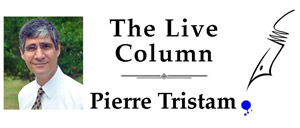
Most of us remember Tom Joad’s great speech toward the end of Steinbeck’s Grapes of Wrath, when Tom, with cops and skull-cracking union-busters on his heels, tries to explain to his mother that his perdition is irrelevant because “maybe like Casy says, a fella ain’t got a soul of his own, but on’y a piece of a big one–and then–”
 “Then what, Tom?” his uncomprehending mother asks. (Jim Casy is the Christ-like figure that ghosts over the novel like Oklahoma dust.)
“Then what, Tom?” his uncomprehending mother asks. (Jim Casy is the Christ-like figure that ghosts over the novel like Oklahoma dust.)
“Then it don’ matter. Then I’ll be all around in the dark. I’ll be everywhere–wherever you look. Wherever they’s a fight so hungry people can eat, I’ll be there. Wherever they’s a cop beating’ up a guy, I’ll be there. If Casy knowed, why, I’ll be in the way guys yell when they’re mad an’–I’ll be in the way kids laugh when they’re hungry an’ they know supper’s ready. An’ when our folks eat the stuff they raise an’ live in the houses they build–why, I’ll be there.”
It is the voice of solidarity, a communion with needs and pains greater than one’s own, a willingness not only to walk in the other’s shoes, but to be the shoes–to be the soles–when the other has none. It was once the voice of America.
Steinbeck, an avid reader of the Bible and the newspapers–two sides of the same coin–didn’t entirely come up on his own with the words or their spectral cadences, which have a tradition behind them as far back as the Book of Ruth. Ruth tells Naomi, her mother-in-law who has lost everything: “Where you go I will go, and where you stay I will stay. Your people will be my people and your God my God. Where you die I will die, and there I will be buried.”
Ruth’s words never cease to be quoted, but rarely so poignantly as when the South Carolina congressman Robert Brown Elliott invoked them–nauralized them as our country’s soul–at the end of a long speech in defense of the 1874 civil rights bill, to “Great applause,” according to the Congressional Record. For all the words’ power, Ruth was really saying nothing different from the Rembrandts’ famous theme song for “Friends” (“Il’ll be there for you”), or the Jackson 5’s take not long before them.
Closer to Steinbeck’s time–he wrote The Grapes of Wrath during the Depression–was Eugene Debs, the more eloquent Bernie Sanders of his day who five times ran for president as a socialist, once from prison. Woodrow Wilson, a thug in Princeton tweed, had put him there in 1918, near the end of World War I, after Debs had told audiences that they were “fit for something better than slavery and cannon fodder.”
But it was at his trial three months later that, addressing the jury, that Debs delivered his Ruthian closing: “While there is a lower class, I am in it; while there is a criminal class, I am of it; while there is a soul in prison, I am not free.” He got 10 years in prison for sedition. I’m not sure anyone saying those words in a Flagler courtroom these days wouldn’t run the risk of seeing their sentence doubled. (Harding commuted the sentence in 1921 but did not pardon him.)
The words of Debs and Steinbeck must have been rattling around somewhere in the mind of Lech Walesa when the former dockyard worker led the labor union revolt from Gdansk and founded Poland’s Solidarity movement, the mangonel that battered the Iron Curtain for a decade before it finally crumbled in 1989 and Walesa was elected president the next year.
The words were certainly in his speech when he accepted the Nobel Peace Prize in 1983, when his Soviet-shackled government wouldn’t allow him to deliver them in person: “With deep sorrow I think of those who paid with their lives for the loyalty to ‘Solidarity,’ of those who are behind prison bars and who are victims of repressions. I think of all those with whom I have traveled the same road and with whom I shared the trials and tribulations of our time.”
I think we have lost that sense of solidarity. When Steinbeck had Tom Joad speak those words most of the country was poor and his book was the biggest seller of 1939, the eighth biggest seller of 1940 (Richard Llewellyn’s How Green Was My Valley was first). If The Grapes of Wrath were published only this year, I doubt it would get reviewed by The New York Times anymore than Emma Lazarus’s “New Colossus”–the poem engraved on the Statue of Liberty’s pedestal–wouldn’t be denounced on the floors of Congress as an invitation to dregs from shithole countries.
It is more satisfying to blame the poor in the old Puritan tradition–poverty as divine reprobation, as punishment for not believing in Reagan and converting to the win-win Church of Steven Covey. It was around that time in America, those 1980s bonfires of vanities and borrowed splurging, of Ron Jeremy, Gordon Gekko and Antonin Scalia, that blame and judgment replaced solidarity, that grievances about what we think we’re losing snuffed out protest on behalf of those not lucky enough to have something to lose.
Judging from what makes good fodder for new laws, successful political candidacies and social media likes–that running referendum on our debased democracy–we normalize talk of concentration camps and mass deportation of migrants. We pass laws re-criminalizing vagrants and the homeless as in the days of Jack London. We decriminalize child labor and thankless work conditions as in the days of Lochner.
We criminalize women and doctors who abort, treat transgender people like lepers, stuff prisoners in the world’s biggest gulag, fire, blacklist and cancel people who speak their mind, protect assault weapons more than children’s books, and glorify born-again bigots. We have replaced compassion with indignation and made grievances the national default setting. We have become a fearful, wrathful country that thinks benevolence is a character weakness and clemency a crime. Tom Joad would recognize a lot of this America, but not its lost capacity to transcend itself, the capacity that so often redeemed this country from Gettysburg to Hyde Park to Grant Park.
If this country is to regain some of its old Colossus footing we need a little less Trump and a bit more Debs, a lot less Tucker Carlson and a lot more Tom Joad. We have precedent. Debs and Steinbeck are as American as Lazarus. A resurrection would be nice. Not having to believe in the impossible would be better.
![]()
Pierre Tristam is the editor of FlaglerLive. A version of this piece airs on WNZF.







![Michael Weatherly and Cote de Pablo Are Back in ‘NCIS: Tony & Ziva’ [PHOTOS]](https://celebjam.com/wp-content/uploads/2025/04/Michael-Weatherly-and-Cote-de-Pablo-Are-Back-in-‘NCIS.webp-260x140.webp)

